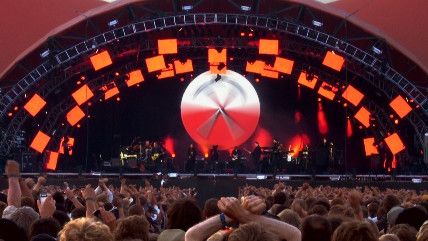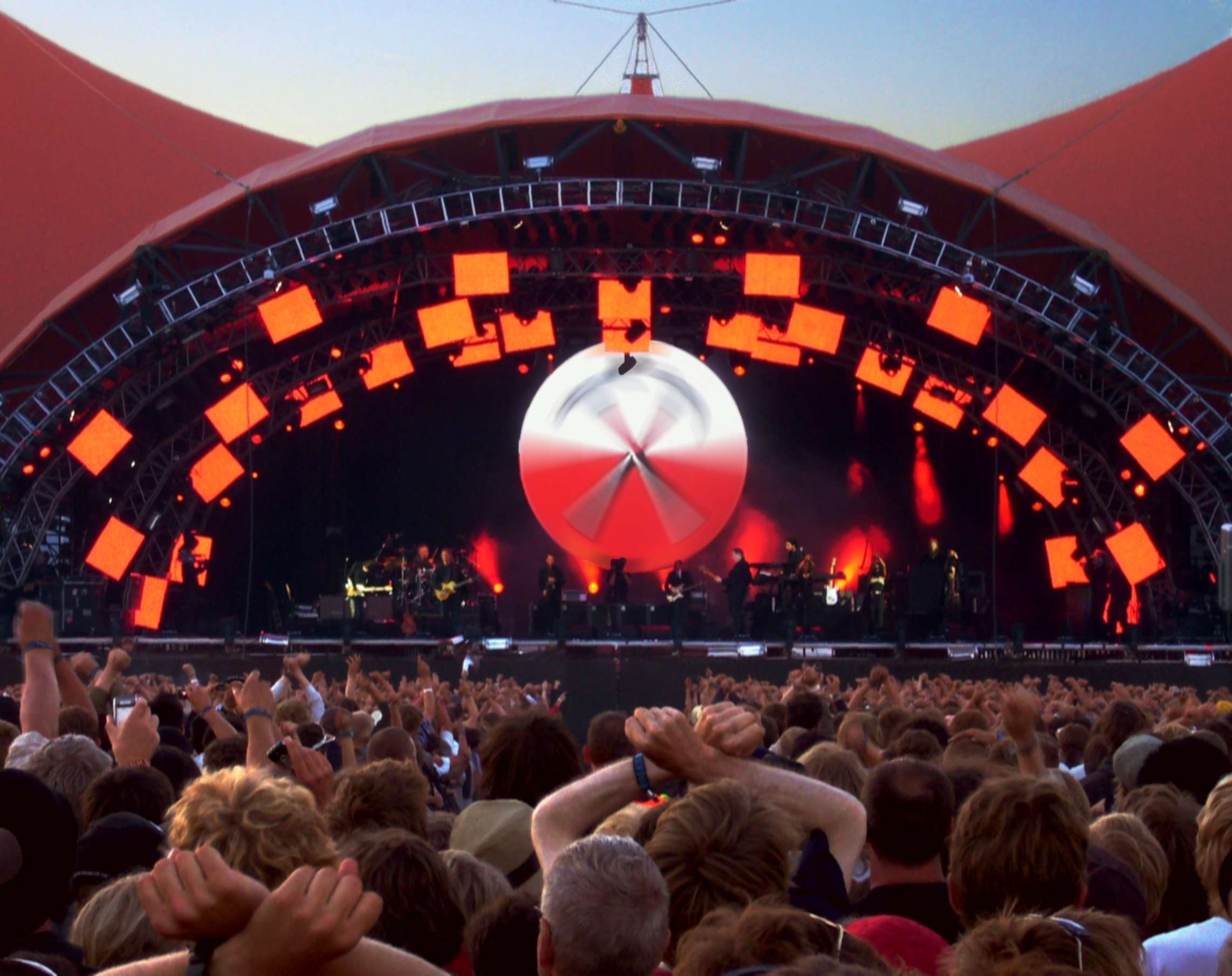Big Brother is Coming to a Music Festival Near You
Police in the U.K. and U.S. have used facial recognition technology on concertgoers.


The United Kingdom is big on mass surveillance, with local authorities reportedly spending over £277 million between 2012 and 2015 on CCTV camera systems.
In 2013, the British Security Industry Authority (BSIA) estimated there were about five million security cameras in the U.K., which works out to one camera for every 14 citizens. A 2015 report in Wired UK suggested the average person in the U.K. is captured on 30 different security systems a day.
Now it appears that facial recognition technology is coming to music festivals, having already been deployed at the Download festival in Leicestershire, England last year. The specific application used, NeoFace, is described on its manufacturer's website as "a contact-free non-obtrusive approach makes for a more easily integrated and acceptable identification solution using existing CCTV cameras." The NEC corporation adds:
Unlike other biometric systems, facial recognition requires no physical or active interaction with the subject, making it one of the least intrusive yet highly accurate biometric modes. It enables faces to be recorded and archived at a distance, act as a crime deterrent, and help identify a person in real-time.
In the United States, we're not quite at U.K.-levels of ubiquitous security cameras, but since the Boston Marathon bombings of 2013, U.S. cities have been racing to catch up. In the immediate aftermath of the bombings, Beantown itself went ahead and secretly used facial recognition technology at a concert in the city's Government Center, an outdoor street-side pavilion only a few miles from the site of the attacks.
Reporters at Dig Boston uncovered documents in 2014 pertaining to surveillance at the Boston Calling concert:
Shockingly, these sensitive documents have been left exposed online for more than a year. Among them are memos written by employees of IBM, the outside contractor involved, presenting plans to use "Face Capture" on "every person" at the 2013 concert. Another defines a party of interest "as anyone who walks through the door."
The urban laboratory described herein details specifications of a so-called Intelligent Operations Center designed and licensed by IBM. As it turns out, this integration of the company's branded Smart Surveillance System (SSS) and Intelligent Video Analytics (IVA) software was preceded by a beta phase piloted at the 2013 Boston Marathon less than two months before the expanded system was rolled out at Boston Calling.
Shortly after Dig's reporting went public, Kade Crockford of the ACLU of Massachusetts Technology for Liberty Project told Noisey's Luke O'Neil, "This is definitely not the first time that government and private actors have worked together to use people attending an event like that as guinea pigs."
Kenneth Lipp, one of the reporters who broke the story for Dig also told Noisey that "what's very concerning is how recklessly they tested something on the public carte blanche, predicated on this Never Forget thing, post-9/11 thing." Lipp adds, "What it means to me is cities using integrated surveillance, having tech partners that establish themselves as contractors in the city by putting their hardware in the infrastructure. Once they have infrastructure in place, they can apply any of the software they want to it."
Boston was understandably on edge after the bombings, and even with government-mandated "lockdowns" and "shelter-in-place" orders, 86 percent of Greater Boston residents reportedly approved of how law enforcement handled the hunt for the Tsarnaev brothers. Almost half of those polled by MassInc Polling Group said "they are more concerned that the government will not go far enough to investigate and prevent terrorist attacks."
So maybe Bostonians wouldn't have minded the use of facial recognition technology being used at a concert so soon after the attacks. But it's not insignificant that the government partnered with a private company and used the surveillance in secret.
As O'Neil notes in Noisey, law enforcement in Boston has in recent years spied on music events as a means of collecting data on Occupy Boston participants and illegal DIY concerts, which are often held without permits. Neither of those rise to the level of public concern as terrorism, but when police and government have fancy new toys, they want to use them.
Editor's Note: As of February 29, 2024, commenting privileges on reason.com posts are limited to Reason Plus subscribers. Past commenters are grandfathered in for a temporary period. Subscribe here to preserve your ability to comment. Your Reason Plus subscription also gives you an ad-free version of reason.com, along with full access to the digital edition and archives of Reason magazine. We request that comments be civil and on-topic. We do not moderate or assume any responsibility for comments, which are owned by the readers who post them. Comments do not represent the views of reason.com or Reason Foundation. We reserve the right to delete any comment and ban commenters for any reason at any time. Comments may only be edited within 5 minutes of posting. Report abuses.
Please to post comments


They also RFID'ed all the wristbands.
I'm imagining them arresting everybody at Electric Daisy Carnival 2020.
They all arrive in driverless Uber cars. Facial recognition catches party people doing ecstasy in the crowd. On their way out of the venue, the driverless Uber cars ignore the destinations chosen by festival goers and take recognized ravers to the police station for processing instead. If being caught in the act on film isn't probable cause, what is?
I see a future where the police can't pull you over and search your driverless car--but they don't have to.
The feds are mandating rear-view cameras on cars. How long before they mandate cameras in the cars. You know, for like safety and stuff.
I saw this story a few weeks ago:
"GM, Lyft to Test Self-Driving Electric Taxis"
http://www.wsj.com/articles/gm.....1462460094
And you gotta think the world that points to is a world where car ownership becomes increasingly unusual. And it's the ownership that makes that kind of government mandate problematic.
Lyft and Uber will probably want cameras in the cars they own in order to deter vandalism and help ensure passenger safety. I don't like where this is headed.
See, I told you self-driving cars were a bad idea.
"a contact-free non-obtrusive approach makes for a more easily integrated and acceptable identification solution using existing CCTV cameras."
So, "acceptable" is one of those words that means something different in Britain than it does in America, huh.
In the United States, we're not quite at U.K.-levels of ubiquitous security cameras
Or so we've been led to believe.
Does the facial recognition work on Juggalos?
Oakleys?
I guess that's the half that enjoys waiting four hours to board a plane and approves of us murder-droning wedding parties in the Middle East.
Libertarian moment.
I rather suspect for most of these cameras are sensitive to IR so as to be useful in low light.
So you modify a hat to include a few high intensity IR LEDs to give the camera something bright to look at.
Bonus points: at night it will mess with the camera's exposure settings so everyone around you gets some protection as well.
Downsides:
You'll stand out to anyone actually watching the security cameras.
They might create an algorithm to auto-detect this and alert people on the ground to intercept anyone doing it
Might not work in broad daylight
You might look like a dork
And I was hoping for Big Brother and the Holding Company:
https://www.youtube.com/watch?v=qA78eLqHLkM
The FBI has been using Burning Man to test surveillance techniques for a decade. It seems like tinfoil hat nonsense until you see that they admitted it.
You're free to peacefully assemble into boxcars.
And the cameras are often controlled and can move around.
Back when I lived in London I was having one night at my favorite Thai place. It was a slow night, and the weather was great, so I was sitting next to an opened window on the 2d floor (what the Brits call the first floor).
There was a security camera on a pole that across the street from the restaurant that I never noticed before. And suddenly the camera turned my way and was looking right at me (it had been looking at the street). And I became a bit transfixed by this and continued to look at the camera. It never moved off me. I looked away finally and about 30 seconds later I looked back and it was still staring at me. This went on until dinner ended.
And so we edge slowly but inexorably, without a care, towards the constant monitring of everybody's activity in the name of security.
Can this technology peer through a burka or hijab? If not it's pretty bloody useless then!
The best response to such cameras is a raised finger. 🙂
And one of those applications is Showbox apk app. It is one of the best online streaming application for watching Movies and TV Shows. In the starting, this application has been released for only a few of the mobiles and allows users to watch shows online.
Who let this riffraff
into the room!?!
There's one smoking a joint.
And another with spots!
You better run...
Par Benetar?!
Not exactly.